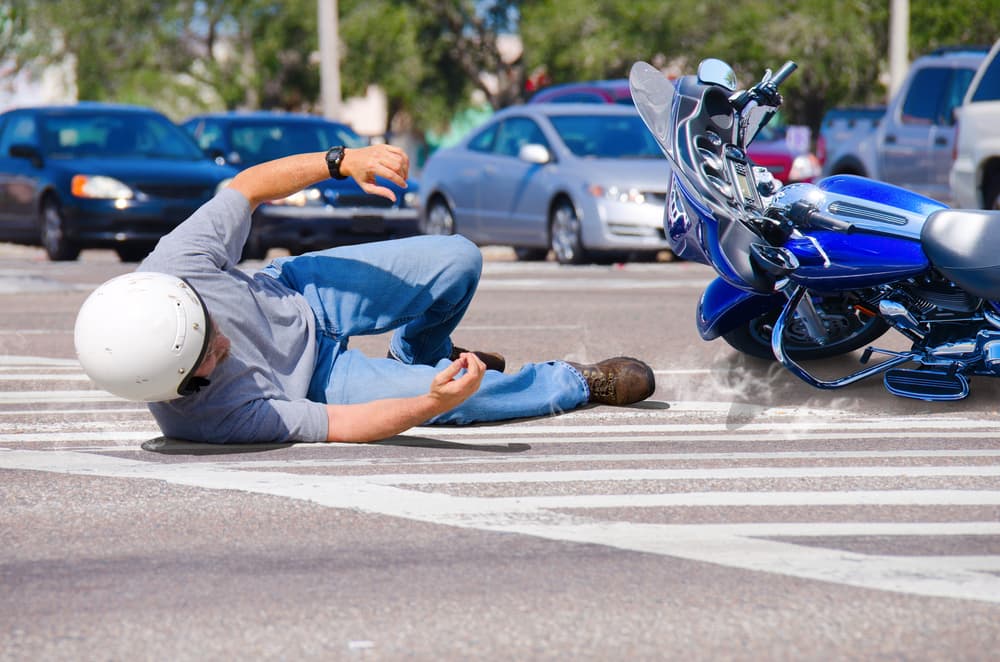If you or a loved one have been in a motorcycle accident resulting in injuries, you may be eligible to recover financial compensation for damages, including medical bills, income losses, and pain and suffering. Families suffering the loss of a loved one due to wrongful death may also secure a settlement for damages of the decedent before death and losses the surviving family endures following it—such as pain and suffering. Schedule a free case evaluation to discuss the merits of your motorcycle accident claim.
What Is Pain and Suffering?
Pain and suffering are the non-economic damages you incur due to a motorcycle accident. They refer to the intangible losses you suffer that are not easily measured in monetary terms. Unlike economic damages, pain and suffering damages don’t come with a receipt. Common pain and suffering following a motorcycle accident include:
- Cognitive impairment caused by spinal cord or traumatic brain injuries (TBIs)
- Paralysis caused by spinal cord injuries
- Scarring and disfigurement caused by road rash and other injuries
- Permanent impairment—loss of a limb, hearing loss, or vision loss
- Reduced mobility
- Chronic long-term or lifelong pain conditions
- Loss of enjoyment of life
- Inability to perform daily tasks or work-related duties
- Mental suffering—emotional distress and anguish
- Loss of sexual relations
- Sleep discomfort and disturbances—nightmares and insomnia
- Worsening of previous health conditions or shortened life expectancy
- Psychological trauma—generalized anxiety, post-accident depression, post-traumatic stress disorder (PTSD), and amaxophobia or motorcycle phobia
Pain management following a motorcycle collision often requires the use of addictive medications, including opioids. Prolonged use of opioids can lead to tolerance, dependence, addiction, and overdose.
Suppose you or a loved one develops a substance use disorder from pain management required due to injuries in a motorcycle crash. In that case, an attorney can seek compensation for this additional damage. It’s an unfortunate reality for some motorcycle accident victims. Contact a lawyer to discuss your case specifics.
Methods of Calculating Pain and Suffering
How do lawyers determine how much pain and suffering is worth after a motorcycle accident? There are two methods to calculate non-economic damages: the multiplier and the per diem. The severity of your injuries, treatment length, impact on the quality of your life, and jurisdictional guidelines influence which method is most appropriate for your calculations.
How Much Is Pain and Suffering Worth for a Motorcycle Accident Using the Multiplier Method?
Determining the value of your pain and suffering using the multiplier method involves multiplying your economic losses by a number between 1.5 and 5. Your economic losses include medical bills, lost income, motorcycle repairs or replacement, and other property damages, quantifiable by financial documents.
The multiplier number is determined by the severity of your injuries and how they affect your day-to-day and long-term required care needs—the more severe your injuries and recovery, the higher the multiplier number.
How Much Is Pain and Suffering Worth for a Motorcycle Accident Using the Per Diem Method?
The per diem method involves assigning a monetary value to each day between the date of the motorcycle accident and the day you reach your maximum medical improvement (MMI)—the point at which your condition has stabilized and further medical treatment is unlikely to lead to significant improvement.
The per diem method uses your daily income before your accident as a basis figure, making it more challenging to use, especially for long-term injuries. The multiplier method is usually preferred for calculating how much pain and suffering is worth for a motorcycle accident.
Do Insurance Companies Use the Same Methods to Calculate Pain and Suffering?
Not always. Insurance companies may use similar methods. However, there are no standardized formulas. Insurance companies often use computer programs to calculate pain and suffering. They also analyze your treatment details, including the length of your treatment and the types of doctors you received care from. They will attempt to minimize their settlement if they determine your medical treatment doesn’t match your injuries. That common insurance company practice is another viable reason to retain the help of a motorcycle accident attorney.
How to Prove Pain and Suffering
Due to the nature of pain and suffering, it is much more challenging to prove. Motorcycle accident lawyers rely on detailed medical records with physician notes, mental health records documenting diagnosis and treatment, pain and suffering journals, and testimony.
Medical Records

Medical records prove pain and suffering by documenting your motorcycle accident, injuries, treatment, pain management, and limitations or restrictions on daily activities. They generally include complaints of pain, chronic pain, and the severity of your injuries. Physician notes regarding treatments and emotional distress relating to injuries are also helpful in proving pain and suffering.
Mental Health Records
Mental health records help establish pain and suffering by documenting a diagnosed mental health condition directly linked to your motorcycle collision. These details will include the severity of your symptoms, the treatment received, and how the mental health condition or disorder impacts your daily life. Diagnoses that qualify as pain and suffering following a motorcycle accident are anxiety, depression, PTSD, and phobias.
Photographic and Video Evidence
Photographic evidence documenting injuries immediately following a motorcycle crash helps establish the severity, and pictures of property damages can prove loss. Video evidence documenting the emotional toll of your motorcycle accident and daily struggles or limitations will also be considered when valuing pain and suffering.
Pain and Suffering Journal
Your pain and suffering journal is a vital piece of evidence for proving pain and suffering in a motorcycle accident. It’s important to keep consistent, dated, and detailed entries regarding:
- Severity of pain (scale of one to ten)
- Type of pain (radiating, dull, aching, sharp)
- The location, duration, and frequency of pain
- Possible causes of pain (physical activities, specific movements)
- Methods of pain management (medications, massage, psychotherapy, heat and ice, meditation)
- Treatment effectiveness and changes in treatment
- Record of symptoms (dizziness, headaches, numbness, and tingling)
- Mental suffering
- Loss of enjoyment of life
- Record of sleep disturbances
You can also record your travel time and expenses to and from medical, rehabilitation, and mental health appointments. These are additional damages your attorney may recover in your settlement.
Testimony
Testimony goes a long way in establishing pain and suffering damages after a motorcycle collision. In addition to personal testimony, your lawyer may gather testimony from family members, friends, coworkers, and other witnesses to how pain and suffering affect your daily life.
How a Motorcycle Accident Attorney Will Help

The motorcycle claims process and legal system involve many challenges and can overwhelm injured parties. Fortunately, motorcycle accident lawyers are here to handle the process on your behalf.
They offer contingency arrangements so everyone can retain legal counsel. Contingency arrangements guarantee that clients do not pay any upfront fees or out-of-pocket costs. Instead, they agree to a contingent fee, or percentage of compensation, when their attorney settles their case.
Additionally, they provide peace of mind, protection against insurance companies, comprehensive case investigation, valuation of case damages, skilled negotiations, and representation in court.
Provide Peace of Mind
Experienced motorcycle accident attorneys are highly educated in tort law and understand federal, state, and local regulations. They also have experience with the local court system and have made connections with judges and defense attorneys that may benefit your case. Understanding this provides peace of mind to clients trusting lawyers to handle their motorcycle accident claims.
Protection Against Liable Insurers
Insurance companies are ruthless about settling claims quickly and for as little as possible. Sometimes, it involves employing bad-faith tactics with unrepresented accident victims. Examples of bad-faith insurance tactics are as follows:
- Unreasonable motorcycle claim denials
- Significantly undervaluing claims
- Refusing to pay valid claims
- Failing to or improper investigation of motorcycle accident claims
- Threatening the motorcycle accident victim
- Requesting excessive amounts of unnecessary paperwork
- Misrepresenting policies or the law
If you believe you’re a victim of bad-faith insurance tactics, you may have a claim to legal action against the insurer for violating its duty to act in good faith with insurance policyholders. Speak to a motorcycle accident lawyer to discuss the merits of your claim.
Comprehensive Case Investigation

Evidence is key in establishing how much pain and suffering is worth for a motorcycle accident. Your lawyer will gather, preserve, and analyze evidence with experts to explore all possible liable parties and maximize compensation. Evidence involved in motorcycle collisions may include:
- Official police report documenting the motorcycle crash
- Witness statements providing an unbiased perspective of the collision
- Photographs of the accident scene, motorcycle damages, and your injuries
- Video from traffic cams, dashcams, and commercial security footage of the accident scene
- Medical records linking your injuries to the motorcycle accident
- Medical bills, motorcycle repair bills, and lost income statements documenting income losses
A motorcycle accident lawyer may work with motorcycle accident reconstruction experts to recreate the circumstances of your crash. They will visit the accident scene and use computer simulations, 3D modeling, and diagrams to demonstrate liability and negligence.
Valuation of Case Damages
Pain and suffering are not the only damages you can seek compensation for in a motorcycle accident insurance claim or lawsuit. Your attorney will investigate all areas where you may have experienced losses, including:
- Healthcare Costs: All healthcare costs, including ambulance and emergency, surgical care and post-op, general practitioner evaluation and follow-ups, medical devices, imaging services (X-rays, CT scans, MRIs), mental health services, physical therapy, massage, orthopedics, occupational and vocational therapy, and future healthcare expenses.
- Disability Damages: Disability damages may involve modifications to homes and vehicles to accommodate an injury and assistive devices, such as wheelchairs, walkers, canes, and hearing aids. Additional disability-compensated losses include paralysis, amputation, traumatic brain injury, spinal cord injuries, loss of muscle control, vision or hearing loss, chronic pain, and the need for assistive devices and long-term care.
- Lost Earnings: All income losses, such as wages or salary, commission and bonuses, overtime, sick leave, paid time off (PTO), vacation days, medical benefits, retirement, and diminished or lost earning capacity due to impairment or disability.
- Domestic Services: Any hired home management services needed during recovery, including housekeeping, laundry, cooking, yard maintenance, childcare, senior care, and grocery, meal, and prescription delivery services.
- Non-Economic Damages: Psychological trauma (anxiety, depression, PTSD), loss of society and companionship, loss of consortium, sleep disturbances, decreased quality of life, mental anguish, cognitive issues, sexual dysfunction, and lifelong pain management.
- Wrongful Death Damages: Final arrangement costs, including funeral or medical services, burial or cremation, final medical expenses, pain and suffering of the decedent, pain and suffering of the wrongful death claimant, loss of consortium, loss of parental guidance, loss of household services, loss prospect of inheritance, and the decedent’s loss of financial support and benefits.
Your motorcycle accident lawyer can prove your damages with paperwork documenting financial losses, such as healthcare bills, motorcycle repair invoices, pay stubs, bank statements, tax returns, employer statements, and receipts for out-of-pocket expenses, like copays and prescription costs.
Skilled Negotiations
An invaluable service motorcycle accident attorneys possess is negotiating. Insurance companies typically start with a low offer to minimize their company’s losses. However, lawyers are skilled negotiators and confident in what they do. Negotiations may involve several rounds of offers and demands before all parties agree on settlement terms.
Your lawyer will discuss all offers and advise you of what is in your best interest regarding accepting or rejecting them. Ultimately, however, the final decision to accept or reject a settlement offer is yours.
Litigation
In cases where liable insurance companies refuse to settle for reasonable compensation, motorcycle accident attorneys may file a civil lawsuit to recover their damages. Litigation involves discovery and other pre-trial proceedings.
While both sides prepare for litigation, they will continue to try to resolve your motorcycle accident claim before going to court. Most of the time, motorcycle accident claims are settled without litigation.
Consult a Motorcycle Accident Lawyer
If you or a loved one have been injured in a motorcycle accident, you’ll want to speak to an attorney to determine how much your pain and suffering is worth. Schedule a free case evaluation today to discuss a plan to recover compensation for your pain and suffering—as well as other damages incurred.
Jeffery Robinette was admitted to practice law in 1991 and is licensed in all levels of state and federal trial courts in West Virginia. Mr. Robinette is also licensed in all state and federal appeals courts in West Virginia and the United States Supreme Court. As a National Board Certified Trial Attorney who has handled hundreds of motor vehicle, injury, and construction defect claims and a leading author on insurance claims settlement issues and difficulties in West Virginia, Jeff Robinette is uniquely qualified to represent your best interest.





